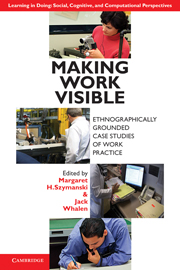Book contents
- Frontmatter
- Contents
- List of Figures and Excerpts
- List of Tables
- List of Contributors
- Series Foreword
- Foreword by John Seely Brown
- Acknowledgments
- Introduction
- Part I Work Practice Study in Historical Context
- Part II Applying Work Practice Methods
- Part III Practices around Documents
- Part IV The Customer Front
- Part V Learning and Knowledge Sharing
- 14 Communal Knowledge Sharing
- 15 Designing Document Solutions for Airline Maintenance Advisories
- 16 Transforming Information System Design
- 17 Rethinking How Projects Are Managed
- Part VI Competency Transfer
- References
- Index
- LEARNING IN DOING: SOCIAL, COGNITIVE AND COMPUTATIONAL PERSPECTIVES
15 - Designing Document Solutions for Airline Maintenance Advisories
Published online by Cambridge University Press: 05 August 2012
- Frontmatter
- Contents
- List of Figures and Excerpts
- List of Tables
- List of Contributors
- Series Foreword
- Foreword by John Seely Brown
- Acknowledgments
- Introduction
- Part I Work Practice Study in Historical Context
- Part II Applying Work Practice Methods
- Part III Practices around Documents
- Part IV The Customer Front
- Part V Learning and Knowledge Sharing
- 14 Communal Knowledge Sharing
- 15 Designing Document Solutions for Airline Maintenance Advisories
- 16 Transforming Information System Design
- 17 Rethinking How Projects Are Managed
- Part VI Competency Transfer
- References
- Index
- LEARNING IN DOING: SOCIAL, COGNITIVE AND COMPUTATIONAL PERSPECTIVES
Summary
Introduction
At the turn of the 21st century, Xerox Global Services (XGS) was looking to build on Xerox's traditional strengths in product development and solutions sales by providing business process consulting and outsourcing services for large enterprise customers. This would expand the value Xerox could bring to its large customer base by helping customers reduce operating costs and improve processes. XGS was deploying conventional approaches such as Lean Six Sigma (LSS) as well as developing a set of assessment tools to help guide and define their consulting practices.
One area of interest to XGS was the ethnographic-based Work Practice approach, already in use in Xerox Research for several years. Prior to the existence of XGS, extensive studies of field service technician work (Orr, 1996, 2006; Bobrow and Whalen, 2002, Whalen and Bobrow, this volume) illustrated the value of applying work practice methods to understand technical work to inform the design of technology solutions intended to support that work. XGS recognized that the qualitative Work Practice approach was an ideal complement to the quantitative nature of LSS studies. Although the facts and figures resulting from a LSS study are necessary to demonstrate and justify the need for new or changed processes and technologies, they do not sufficiently support all complex consulting engagements. In many cases, a deep understanding of the social and cultural aspects of a work process is necessary to define not only what needs to change, but how best to make those changes so that they fit in the social context of the work and are adopted by the workers with minimal disruption.
Information
- Type
- Chapter
- Information
- Making Work VisibleEthnographically Grounded Case Studies of Work Practice, pp. 285 - 298Publisher: Cambridge University PressPrint publication year: 2011
